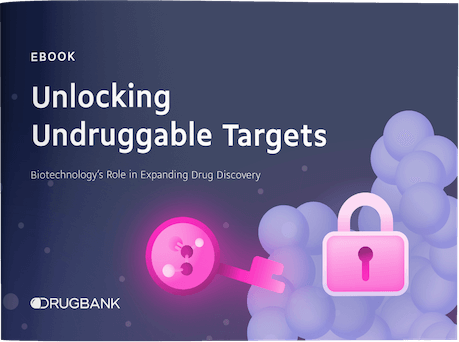Explore a selection of our essential drug information below, or:
Identification
- Summary
Aducanumab is a monoclonal antibody indicated in the treatment of Alzheimer's disease.
- Brand Names
- Aduhelm
- Generic Name
- Aducanumab
- DrugBank Accession Number
- DB12274
- Background
Aducanumab, or BIIB037, is a monoclonal IgG1 antibody that targets extracellular amyloid-β plaques in the brain; similar to gantenerumab, bapineuzumab and solanezumab.1,4 Aducanumab is a recombinant antibody derived from patients with slow or absent cognitive decline, and phase 1b clinical trial data have shown patients treated with aducanumab show a reduction in amyloid-β plaques.1 Based on Mini-Mental State Examination and Clinical Dementia Rating (CDR), patients taking aducanumab showed signs of slowing progression; however, these data were controversial.1,3 Clinical trials showed a 23% relative difference between the experimental and placebo groups as determined by CDR; however, this is equivalent to an absolute difference of 0.4/18.3
Although aducanumab's approval represents the first drug treatment for Alzheimer's disease, the approval is conditional on further results.7 Biogen enrolled patients in phase 3 clinical trials in 2015 but increased the size of the trials from 1350 patients to 1650 patients to maintain statistical power in the face of a high standard deviation.3 Development of aducanumab was discontinued in March 2019 when two phase 3 clinical trials did not pass futility analysis; however, Biogen sought FDA approval in October 2019 after reanalyzing the data 3 and aducanumab was granted accelerated FDA approval on 7 June 2021.6 In January 2024, Biogen announced that the development and commercialization of aducanumab will be discontinued to prioritize the marketing of lecanemab, another drug approved for the treatment of Alzheimer's disease.9
- Type
- Biotech
- Groups
- Approved, Investigational
- Biologic Classification
- Protein Based Therapies
Monoclonal antibody (mAb) - Protein Chemical Formula
- Not Available
- Protein Average Weight
- 146000.0 Da (Approximate)
- Sequences
- Not Available
- Synonyms
- Aducanumab
- aducanumab-avwa
- External IDs
- BIIB 037
- BIIB-037
- BIIB037
Pharmacology
- Indication
Aducanumab is indicated for the treatment of Alzheimer’s disease. Treatment should be initiated in patients with mild cognitive impairment or mild dementia stage of disease, the population in which treatment was initiated in clinical trials. There are no safety or effectiveness data on initiating treatment at earlier or later stages of the disease than were studied.8
 Reduce drug development failure ratesBuild, train, & validate machine-learning modelswith evidence-based and structured datasets.Build, train, & validate predictive machine-learning models with structured datasets.
Reduce drug development failure ratesBuild, train, & validate machine-learning modelswith evidence-based and structured datasets.Build, train, & validate predictive machine-learning models with structured datasets.- Associated Conditions
Indication Type Indication Combined Product Details Approval Level Age Group Patient Characteristics Dose Form Treatment of Alzheimer's disease (ad) •••••••••••• •••• •••••••• •• ••• ••••••••••• •••• ••••••••• Treatment of Alzheimer's disease (ad) •••••••••••• •••• ••••••••• •••••••••• ••••• ••••••••• - Contraindications & Blackbox Warnings
 Prevent Adverse Drug Events TodayTap into our Clinical API for life-saving information on contraindications & blackbox warnings, population restrictions, harmful risks, & more.Avoid life-threatening adverse drug events with our Clinical API
Prevent Adverse Drug Events TodayTap into our Clinical API for life-saving information on contraindications & blackbox warnings, population restrictions, harmful risks, & more.Avoid life-threatening adverse drug events with our Clinical API- Pharmacodynamics
Aducanumab is a monoclonal IgG1 antibody that binds to amyloid-β, reducing amyloid plaques in the brain.6 It has a long duration of action as it is given once every 4 weeks.6 Patients should be counselled regarding the risk of amyloid related imaging abnormalities, including microhemorrhages, and hypersensitivity reactions.6
- Mechanism of action
Alzheimer's disease is a neurodegenerative disease.1 Part of the pathology of Alzheimer's disease is the presence of plaques forming extracellularly in the brain.1 These plaques are mostly composed of amyloid-β, a peptide of varying length formed by the cleavage of the amyloid precursor protein.1 The "amyloid cascade hypothesis" suggests that the accumulation of amyloid-β oligopeptides in the brain drives the pathogenesis of Alzheimer's disease.4
Aducanumab is a monoclonal IgG1 antibody that binds to amyloid-β at amino acids 3-7.1,6 The amyloid-β residues Phe4, His6, Glu3, and Arg5 are responsible for the majority of the contact between amyloid-β and aducanumab's Fab region.1 Data from studies in mice and humans shows aducanumab treatment reduces amyloid-β, however human trials show non-significant changes in amyloid-β40 and amyloid-β42 across a dose range of 0.3-30 mg/kg and an increase in amyloid-β40 and amyloid-β42 at 60 mg/kg.4
Aducanumab treatment is associated with slowing the rate of progression of Alzheimer's disease, based on Mini-Mental State Examination, Clinical Dementia Rating, and levels of p-tau in the cerebrospinal fluid.2
Target Actions Organism AAmyloid-beta precursor protein antagonistbinderantibodyHumans - Absorption
A 10 mg/kg intravenous dose of aducanumab reached a Cmax of 182.7 µg/mL, with a Tmax of 3.0 hours, and an AUCinf of 31,400 h*µg/mL.4
- Volume of distribution
The volume of distribution of aducanumab is 9.63 L.6
- Protein binding
Not Available
- Metabolism
Aducanumab is expected to be broken down into smaller oligopeptides and amino acids.5,6
- Route of elimination
Monoclonal IgG is predominantly eliminated by catabolism to individual amino acids that are either recycled in the body or metabolized for energy.5
- Half-life
The terminal half life of aducanumab is 24.8 days.6
- Clearance
A 10 mg/kg intravenous dose of aducanumab has a clearance of 0.39 mL/h/kg.4
- Adverse Effects
 Improve decision support & research outcomesWith structured adverse effects data, including: blackbox warnings, adverse reactions, warning & precautions, & incidence rates. View sample adverse effects data in our new Data Library!Improve decision support & research outcomes with our structured adverse effects data.
Improve decision support & research outcomesWith structured adverse effects data, including: blackbox warnings, adverse reactions, warning & precautions, & incidence rates. View sample adverse effects data in our new Data Library!Improve decision support & research outcomes with our structured adverse effects data.- Toxicity
Patients experiencing dose-limiting toxicity may present with amyloid-related imaging abnormalities including edema or microhemorrhages of the brain.4 Symptoms of dose limiting toxicity were generally transient,4 however patients may need to be treated with symptomatic and supportive measures.
- Pathways
- Not Available
- Pharmacogenomic Effects/ADRs
- Not Available
Interactions
- Drug Interactions
- This information should not be interpreted without the help of a healthcare provider. If you believe you are experiencing an interaction, contact a healthcare provider immediately. The absence of an interaction does not necessarily mean no interactions exist.
Drug Interaction Integrate drug-drug
interactions in your softwareAbciximab The risk or severity of adverse effects can be increased when Abciximab is combined with Aducanumab. Adalimumab The risk or severity of adverse effects can be increased when Adalimumab is combined with Aducanumab. Alemtuzumab The risk or severity of adverse effects can be increased when Alemtuzumab is combined with Aducanumab. Alirocumab The risk or severity of adverse effects can be increased when Alirocumab is combined with Aducanumab. Amivantamab The risk or severity of adverse effects can be increased when Aducanumab is combined with Amivantamab. - Food Interactions
- No interactions found.
Products
 Drug product information from 10+ global regionsOur datasets provide approved product information including:dosage, form, labeller, route of administration, and marketing period.Access drug product information from over 10 global regions.
Drug product information from 10+ global regionsOur datasets provide approved product information including:dosage, form, labeller, route of administration, and marketing period.Access drug product information from over 10 global regions.- International/Other Brands
- Aduhelm (Biogen)
- Brand Name Prescription Products
Name Dosage Strength Route Labeller Marketing Start Marketing End Region Image Aduhelm Injection, solution 100 mg/1mL Intravenous Biogen Inc. 2021-06-07 Not applicable US Aduhelm Injection, solution 100 mg/1mL Intravenous Biogen Inc. 2021-06-07 Not applicable US
Categories
- ATC Codes
- N06DX03 — Aducanumab
- Drug Categories
- Chemical TaxonomyProvided by Classyfire
- Description
- Not Available
- Kingdom
- Organic Compounds
- Super Class
- Organic Acids
- Class
- Carboxylic Acids and Derivatives
- Sub Class
- Amino Acids, Peptides, and Analogues
- Direct Parent
- Peptides
- Alternative Parents
- Not Available
- Substituents
- Not Available
- Molecular Framework
- Not Available
- External Descriptors
- Not Available
- Affected organisms
- Not Available
Chemical Identifiers
- UNII
- 105J35OE21
- CAS number
- 1384260-65-4
References
- General References
- Arndt JW, Qian F, Smith BA, Quan C, Kilambi KP, Bush MW, Walz T, Pepinsky RB, Bussiere T, Hamann S, Cameron TO, Weinreb PH: Structural and kinetic basis for the selectivity of aducanumab for aggregated forms of amyloid-beta. Sci Rep. 2018 Apr 23;8(1):6412. doi: 10.1038/s41598-018-24501-0. [Article]
- Cummings J, Aisen P, Lemere C, Atri A, Sabbagh M, Salloway S: Aducanumab produced a clinically meaningful benefit in association with amyloid lowering. Alzheimers Res Ther. 2021 May 10;13(1):98. doi: 10.1186/s13195-021-00838-z. [Article]
- Schneider L: A resurrection of aducanumab for Alzheimer's disease. Lancet Neurol. 2020 Feb;19(2):111-112. doi: 10.1016/S1474-4422(19)30480-6. Epub 2019 Dec 4. [Article]
- Ferrero J, Williams L, Stella H, Leitermann K, Mikulskis A, O'Gorman J, Sevigny J: First-in-human, double-blind, placebo-controlled, single-dose escalation study of aducanumab (BIIB037) in mild-to-moderate Alzheimer's disease. Alzheimers Dement (N Y). 2016 Jun 20;2(3):169-176. doi: 10.1016/j.trci.2016.06.002. eCollection 2016 Sep. [Article]
- Ryman JT, Meibohm B: Pharmacokinetics of Monoclonal Antibodies. CPT Pharmacometrics Syst Pharmacol. 2017 Sep;6(9):576-588. doi: 10.1002/psp4.12224. Epub 2017 Jul 29. [Article]
- FDA Approved Drug Products: Aduhelm (Aducanumab-avwa) Intravenous Injection [Link]
- FDA News Release: FDA Grants Accelerated Approval for Alzheimer’s Drug [Link]
- FDA Approved Drug Products: ADUHELM (aducanumab-avwa) injection for intravenous use (February 2023) [Link]
- AJMC: Biogen Abandons Aducanumab, Pivots Focus to Lecanemab for Alzheimer Disease [Link]
- External Links
- PubChem Substance
- 347911309
- 2557218
- Wikipedia
- Aducanumab
Clinical Trials
- Clinical Trials
Clinical Trial & Rare Diseases Add-on Data Package
Explore 4,000+ rare diseases, orphan drugs & condition pairs, clinical trial why stopped data, & more. Preview package Phase Status Purpose Conditions Count Start Date Why Stopped 100+ additional columns Unlock 175K+ rows when you subscribe.View sample data3 Completed Treatment Alzheimer's Disease (AD) / Mild Cognitive Impairment (MCI) 1 somestatus stop reason just information to hide 3 Terminated Treatment Alzheimer's Disease (AD) 4 somestatus stop reason just information to hide 2 Terminated Treatment Alzheimer's Disease (AD) / Cognitive Dysfunctions 1 somestatus stop reason just information to hide 1 Completed Basic Science Alzheimer's Disease (AD) 1 somestatus stop reason just information to hide 1 Completed Treatment Alzheimer's Disease (AD) 2 somestatus stop reason just information to hide
Pharmacoeconomics
- Manufacturers
- Not Available
- Packagers
- Not Available
- Dosage Forms
Form Route Strength Injection, solution Intravenous 100 mg/1mL - Prices
- Not Available
- Patents
- Not Available
Properties
- State
- Liquid
- Experimental Properties
- Not Available
Targets

- Kind
- Protein
- Organism
- Humans
- Pharmacological action
- Yes
- Actions
- AntagonistBinderAntibody
- General Function
- Functions as a cell surface receptor and performs physiological functions on the surface of neurons relevant to neurite growth, neuronal adhesion and axonogenesis. Interaction between APP molecules on neighboring cells promotes synaptogenesis (PubMed:25122912). Involved in cell mobility and transcription regulation through protein-protein interactions. Can promote transcription activation through binding to APBB1-KAT5 and inhibits Notch signaling through interaction with Numb. Couples to apoptosis-inducing pathways such as those mediated by G(o) and JIP. Inhibits G(o) alpha ATPase activity (By similarity). Acts as a kinesin I membrane receptor, mediating the axonal transport of beta-secretase and presenilin 1 (By similarity). By acting as a kinesin I membrane receptor, plays a role in axonal anterograde transport of cargo towards synapses in axons (PubMed:17062754, PubMed:23011729). Involved in copper homeostasis/oxidative stress through copper ion reduction. In vitro, copper-metallated APP induces neuronal death directly or is potentiated through Cu(2+)-mediated low-density lipoprotein oxidation. Can regulate neurite outgrowth through binding to components of the extracellular matrix such as heparin and collagen I and IV. The splice isoforms that contain the BPTI domain possess protease inhibitor activity. Induces a AGER-dependent pathway that involves activation of p38 MAPK, resulting in internalization of amyloid-beta peptide and leading to mitochondrial dysfunction in cultured cortical neurons. Provides Cu(2+) ions for GPC1 which are required for release of nitric oxide (NO) and subsequent degradation of the heparan sulfate chains on GPC1
- Specific Function
- DNA binding
- Gene Name
- APP
- Uniprot ID
- P05067
- Uniprot Name
- Amyloid-beta precursor protein
- Molecular Weight
- 86942.715 Da
References
- Arndt JW, Qian F, Smith BA, Quan C, Kilambi KP, Bush MW, Walz T, Pepinsky RB, Bussiere T, Hamann S, Cameron TO, Weinreb PH: Structural and kinetic basis for the selectivity of aducanumab for aggregated forms of amyloid-beta. Sci Rep. 2018 Apr 23;8(1):6412. doi: 10.1038/s41598-018-24501-0. [Article]
- Uhlmann RE, Rother C, Rasmussen J, Schelle J, Bergmann C, Ullrich Gavilanes EM, Fritschi SK, Buehler A, Baumann F, Skodras A, Al-Shaana R, Beschorner N, Ye L, Kaeser SA, Obermuller U, Christensen S, Kartberg F, Stavenhagen JB, Rahfeld JU, Cynis H, Qian F, Weinreb PH, Bussiere T, Walker LC, Staufenbiel M, Jucker M: Acute targeting of pre-amyloid seeds in transgenic mice reduces Alzheimer-like pathology later in life. Nat Neurosci. 2020 Dec;23(12):1580-1588. doi: 10.1038/s41593-020-00737-w. Epub 2020 Nov 16. [Article]
- Sevigny J, Chiao P, Bussiere T, Weinreb PH, Williams L, Maier M, Dunstan R, Salloway S, Chen T, Ling Y, O'Gorman J, Qian F, Arastu M, Li M, Chollate S, Brennan MS, Quintero-Monzon O, Scannevin RH, Arnold HM, Engber T, Rhodes K, Ferrero J, Hang Y, Mikulskis A, Grimm J, Hock C, Nitsch RM, Sandrock A: The antibody aducanumab reduces Abeta plaques in Alzheimer's disease. Nature. 2016 Sep 1;537(7618):50-6. doi: 10.1038/nature19323. [Article]
Drug created at October 20, 2016 21:47 / Updated at October 11, 2024 22:08


